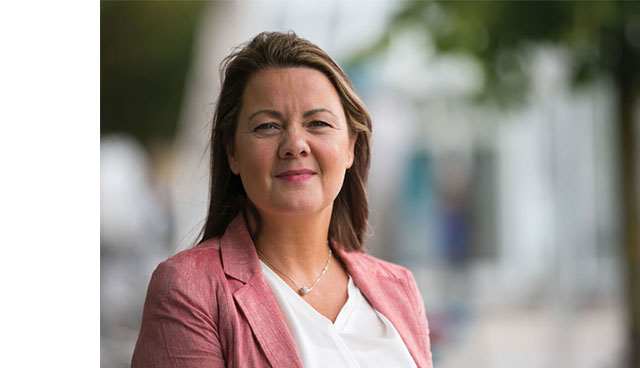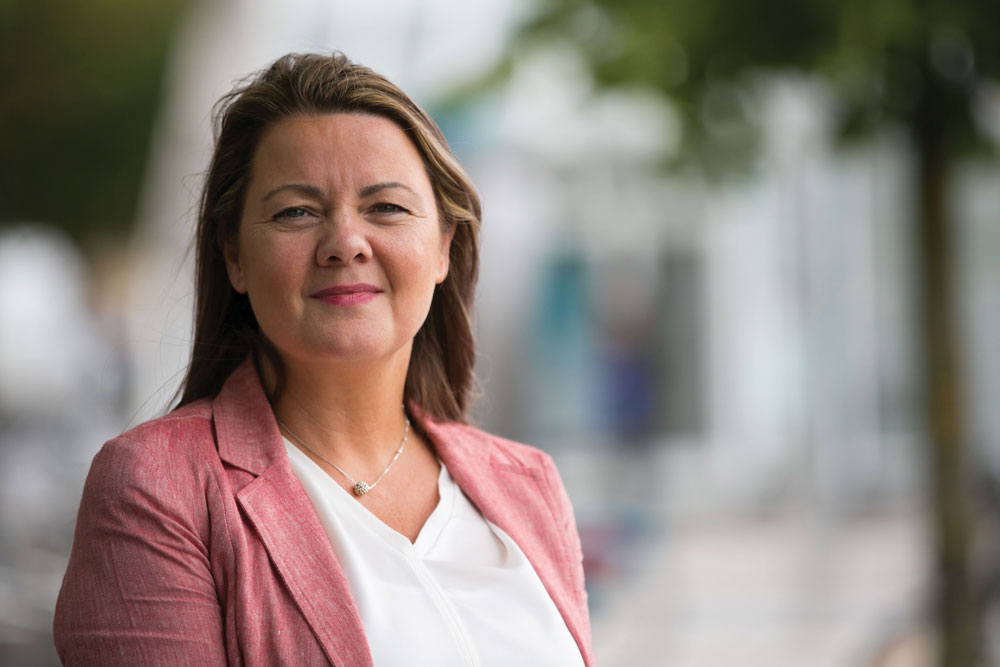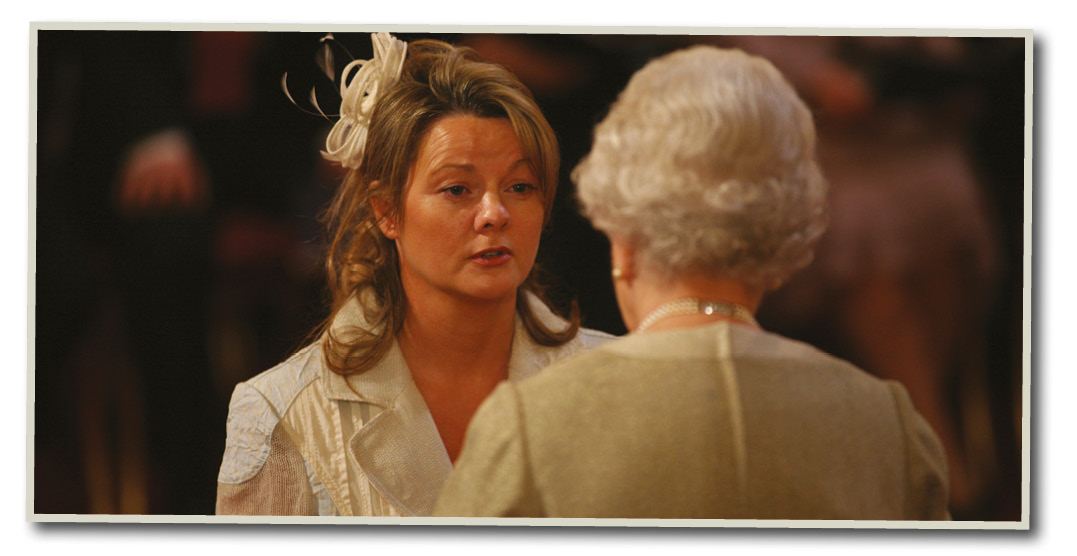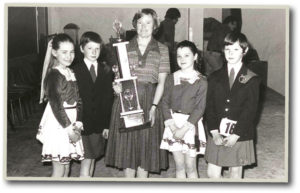Energy for innovation


Senergy Innovations Limited founder Christine Boyle talks to David Whelan about navigating the construction industry as a female managing director and the footing it offered to launch her latest journey pursuing the development of cost and performance efficient solar thermal technology.
Educated in St Dominic’s Grammar School on the Falls Road in west Belfast, even when Christine Boyle (nee Lawell) attended Queen’s University Belfast, becoming the first member of her family, both on her mother and father’s side, to do so, a transition into the family’s roofing business was never something that was given much consideration.
As Christine explains, it wasn’t that there was a lack of appreciation for her talent or that she felt overlooked, it was simply the mindset of society at that time. The fact that the construction sector business was a career path for the males in her family and not the females wasn’t spoken about, it was simply the done thing. After all, construction was a male-dominated industry.
However, that’s not to say that she was not immersed in the conversations around the business that so often populated the family home and dinnertime discussion. These discussions formed an integral part of Christine’s understanding of business operations, along with the experiences of her own career path, which took her into the financial sector, and in particular banking where she spent 12 years.
She explains: “I suppose there was an element of ignorance to the fact that a female could hold a position and perform a valuable role within the construction sector at that time. In hindsight, I’m glad it worked out that way because the finance sector gave me a good training base and broadened my understanding and experience. When my father (Hugh Lawell) was thinking about retirement he recognised the skills that I had acquired and, even as the youngest member of the family, pinpointed me as the most likely person to keep the bank manager happy.”
While confident in her own ability, as a mother of three young girls and the recent owner of her first mortgage, Christine admits to some initial trepidation in taking up the reins as Managing Director of Lawell Asphalt Co. Ltd, initially on a two-year career break from banking.
It’s no coincidence that Christine’s initial years at helm coincided with a period of growth and expansion for the company. However, she is not boastful about the opportunities that she took, to expand into the market in the south of Ireland for example, instead describing it as a “natural transition” following on from some tough times for the company through the Troubles and the ‘80s recession.

“Whilst there were times when the business had flourished, it had also undergone large periods of retraction. I came in at a stage when we started to grow again, we took on bigger contracts and like many others moved into the market in the South and had work in places like the Isle of Man. However, just as things were going well, the ‘90s recession hit and we were pushed back into survival mode. Our reputation helped us in this period, we had to absorb successive blows as large firms who owed us money collapsed, but those that survived wanted us on board for their projects across the water in England, Scotland and even the Shetland Islands.”
Construction
Entering the male-dominated construction industry then as a female, was a strange environment in comparison to the more integrated sector that exists now, admits Christine. Recalling one of her first experiences she says: “For the first while I shadowed my father and one of the first on-site projects was waterproofing the Law Courts in Belfast. Three things happened that day that stick with me. Firstly, I was wolf whistled walking onto the site. I thought my father’s veins were going to pop out of his neck. Secondly, we were on site for quite a while and there was no female toilet and thirdly, the chair of a meeting we attended kept calling me ‘love’. I look back and smile about it now but it’s warming to see that the industry has changed and females are much more an integral part of it.”
Asked if she could be described as a pioneer of this change, Christine responds: “To be honest I never saw it as a challenge I had to face up to or a cause I had to fight. I think my presence alone, getting on with the job in hand, did that for me. I know that there were men around that site who had daughters and hopefully seeing a female on site allowed them to come to the realisation that it should be the norm.”
However, even though Christine was not lacking in confidence, she notes a distinctive difference between working for a major company, like a bank, and running your own business. This recognition led Christine to become a key part of the formation of one of Northern Ireland’s most successful networks.
“The first thing I discovered in taking on the business was the lack of a support network and the burden of responsibility. The transition from banking, where you were supported by a team and appraised for development, to running your own company was lonely. I realised very quickly that I had responsibility for my own personal development, after all, if you’re not learning and growing as a Managing Director you can guarantee that your business is not learning and growing.”
It was in an outdated advertisement in the local Andersonstown News newspaper where Christine noticed a course aimed at bringing together female business owners. In a panic, she rang the organiser, who facilitated Christine joining the course. On its conclusion, some of the members stayed on to form a board with the aim of growing a network directed by female business owners for female business owners. This network grew to be known as the now successful and self-sustaining Women in Business NI, of which Christine was chair for seven years in total.
It was in this capacity that Christine was recommended and received an MBE for her services to business in Northern Ireland. Speaking about accepting the award, she says: “I saw it as a recognition of the growth of the organisation rather than a personal accolade. A recognition of all the females who have sat, and continue to sit, on the voluntary board of Women in Business. I happened to get the MBE but it was for all of all those people who stuck with it and made it a success.”
 Champion Irish dancer: Christine Boyle second from the right
Champion Irish dancer: Christine Boyle second from the right
Innovation
Faced with the challenge of growing the family business in a time of recession, Christine undertook what she describes as “rat in the corner innovation” and in 2012 stepped away from managing the family business to concentrate on establishing the company now known as Senergy Innovations LTD.
Outlining her reasoning for the switch and the function of the company, she says: “The construction industry was changing, manufacturers were bringing on board advanced materials that made installation and manufacturing cheaper. At the same time, solar energy was becoming more mainstream – although not very successfully due to cost and aesthetics. I saw a space for integration based on advanced materials making both roofing and solar more affordable. The Internet of Things (IoT) was also a major influence, digital technology would allow us to cheaply integrate our product into building infrastructure and connect them to a smart heating system on the owner’s mobile device.
“Senergy design and manufacture solar thermal panels that will deliver the next generation of reliable, affordable and emission-free and solar water heating and cooling. Unlike current thermal panels that are made of glass, copper and aluminium, our panels are made from 100 per cent polymer plastic and use nanocomposite materials. We integrate the panels into the smart heating system of the building.
“Seventy per cent of the energy used in large buildings is used on heating and cooling. Solar Thermal is a renewable energy that is 70 per cent efficient which far exceeds Solar Photovoltiac, which is only 18 per cent efficient. Solar Thermal also produces the lowest carbon emissions, is easily generated on site and has the potential to become the main source for heating and cooling energy in the future.”
InvestNI R&D funded, Senergy have raised £700,000 to date and following on from building the initial prototype with the CASE (Centre for Advanced Sustainable Energy) at Queen’s University Belfast, are now building out a real world demonstrator with Ulster University, with planned launch of the product in early 2018.
In its development, the project has received numerous accolades for innovation including winning the much-coveted COINS Construction Industry Grand Challenge and reaching the final of Pitch@Palace. Last year Christine was named an infocus Women in Innovation winner at the Women in Innovation awards held in London.
Meetings with senior Chinese investors and a recent visit to Silicon Valley have proven fruitful for the company and its venture to raise future capital.
Asked about the challenges she faces, Christine points to scaling and investment to ensure that the product is building the necessary team and financial backing. In terms of the processes in rolling out the completed product, Christine says that Senergy are in a very privileged position given the heavy investment in the polymer industry in Northern Ireland over the past 20 years.
“Initially we will use sub-contractors, we’re very lucky in the experience and expertise we have on our doorstep and will seek to leverage this in terms of developing the product and the manufacturing processes that we use. When we go to scale we would want to build a factory of our own.”
Looking further down the line Christine adds: “I am of the belief that challenges come naturally. I don’t think I ended up in the roofing industry with a financial background by chance. In 10 years, I’d like to see Senergy trading globally. If it’s the right thing for the company, then I will still be performing a role that best suits its development. If not, then I’ll be off doing something else more useful.”
Concluding with some words of wisdom to fellow or upcoming entrepreneurs and innovators, Christine preaches the “three P’s”.
“Perseverance, keep pushing for each small win, the snowball will slowly get bigger; patience, Rome wasn’t built in a day; and partners, you need to get out and find the best industry, academic and business partners to make your innovation a reality.”





